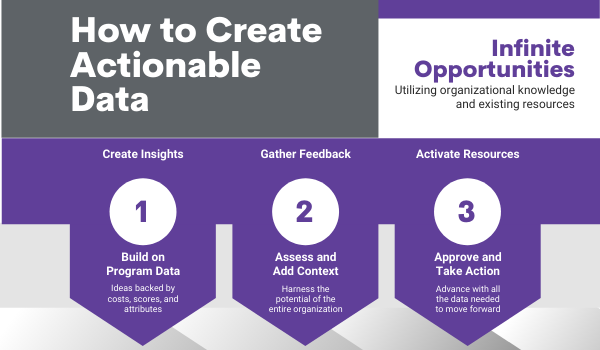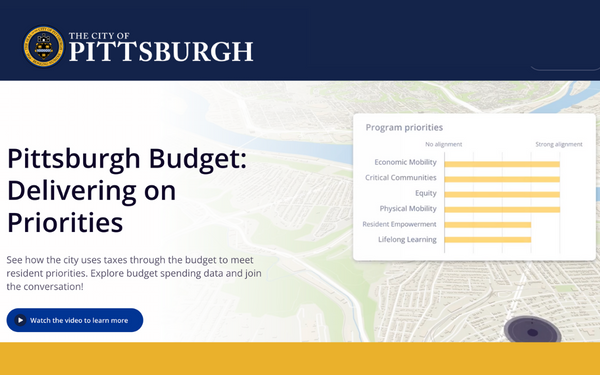Like many cities worldwide, the City of Pittsburgh has already begun to experience the effects of climate change with harsher winters, hotter summers, record-setting precipitation, leading to frequent and destructive landslides, and increased numbers of invasive species. At the local government level, resources and opportunities exist to prepare for the impacts of climate change, but they must be reviewed, prioritized, and put into action.
The budget is an incredibly powerful tool to leverage for change. It is a logical place to begin when building a strategy for implementing a major initiative like Climate Action. However, budget and finance departments speak and think in terms of cycles and expenditures, while those responsible for pursuing outcomes, like Climate Action, are thinking and speaking in terms of impact, resident satisfaction, and cross-departmental co-benefits. Making a shift to communicating, as an organization, on the same level, is incredibly important.
“One of the most powerful levers for change is the budget.”
– Chris Fabian, CEO, ResourceX
A Problem that Needed a Solution
The Sustainability and Resilience Division needs to speak the same language as the Office of Management and Budget while bringing together projects that impact the Climate Action Plan. The City had the opportunity to work with the Natural Resources Defense Council (NRDC) who identified ResourceX and Priority Based Budgeting as a tool and methodology for creating that shared language.
"It's really encouraging in terms of integrating the priorities of the city, establishing them, and putting them into the budgeting process. What's important for me as a sustainability person is about creating a shared language. It's the idea that we create a shared language in terms of how we finance operations and improve outcomes for our residents. It's really what is in everybody's best interest. Right? So creating that shared space in the shared language, it's a huge opportunity you guys create."
- Grant Ervin, Chief Resilience Officer, City of Pittsburgh, Pennsylvania
The City of Pittsburgh began its work with ResourceX and Priority Based Budgeting in October of 2021. They endeavored to create a more data-driven view of their budget to clarify how city funds were being spent and empower decision-makers with more information, specifically information driving two initiatives important to their leadership and community: Equity and Climate Action. To accomplish the targets stated in their Climate Action Plan in a financial atmosphere impacted by COVID-19, a partnership and shared language among City Leadership, the Sustainability and Resilience Division, and the Office of Management and Budget was needed.
Priority Based Budgeting allowed the Sustainability and Resilience Team to begin to fuse the conversation of what they were trying to achieve with the Climate Action and Resilience Plans and where it actually intersected with the Budget Cycle.
"People who manage programs and the budget are often not speaking the same language, and there's this divide. We talk a lot about the need to bridge that in Financial Foundations. We all need to be on the same page. PBB can be the tool that really does bridge that divide."
- Katie Ludwig, Senior Researcher, GFOA
Addressing the Climate Action Plan through Programs
The City of Pittsburgh's Climate Action Plan focuses on the mitigation of carbon emissions. It addresses strategies that the city can take to modify operations and influences to reduce the city's impact overall. Some large-scale plans include the adoption of an electric fleet, energy buybacks, and improvements to the transportation systems. But day-to-day operations must also be reviewed.
Through the City's Priority Based Budgeting efforts, each department identified the programs it provides daily, weekly, monthly or annually to serve the community or help the organization run smoothly. With an inventory of programs readily available, the possibility for review for Climate Action opportunity becomes more accessible. One such program was Procurement. Procurement lives in the Office of Management and Budget but impacts departments across the entire organization.
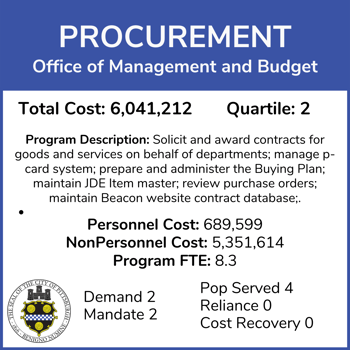 Climate Impact: The paperwork associated with procurement purchase orders and contract management could be monumental for OMB. Then multiply that by each department which likely also manages and keeps records on their end. Procurement was a massive contributor to paper consumption in the city's day-to-day operations.
Climate Impact: The paperwork associated with procurement purchase orders and contract management could be monumental for OMB. Then multiply that by each department which likely also manages and keeps records on their end. Procurement was a massive contributor to paper consumption in the city's day-to-day operations.
Having the data on a program around which communication can happen interdepartmentally is excellent. Teams can discuss the resources utilized to provide that program as it exists today and the impacts those resources are having on the climate (massive consumption of paper) and on the budget (the purchasing of paper, printers, ink, copiers, etc.). And developing the data allows for conversation, but the next step is providing a tool to support taking action on that data.
.png?width=350&name=Insights%20Flyer%20for%20Sales%20(300%20x%20175%20px).png) The next important step after creating the shared language complete with all of the program data is to invite the knowledge base within the organization to ideate on those programs towards the outcome to be achieved. In this case, the City of Pittsburgh was looking for ways to reallocate existing resources towards their Climate Action Plan. The process of looking at the future of a program in PBB terms is called Program Insights.
The next important step after creating the shared language complete with all of the program data is to invite the knowledge base within the organization to ideate on those programs towards the outcome to be achieved. In this case, the City of Pittsburgh was looking for ways to reallocate existing resources towards their Climate Action Plan. The process of looking at the future of a program in PBB terms is called Program Insights.
Program Insights are additional data points added to a program that come from the perspective of the program's future. Program data is the data as it exists today. Insight data is the potential for that program in the future. Insights can be directed towards any outcome, such as addressing a budget shortfall, identifying equity opportunities, recovering from COVID-19, or finding ways to impact the Climate Action Plan.
The Pittsburgh team reconvened with representatives from 23 departments for a facilitated Insight Workshop with ResourceX. They participated in a three-part series with the goals being Creation, Confirmation and Commitment, respectively. Over 60 staff members participated in the creation of the 186 insights. Each of those insights included details about the level of the potential impact on climate and equity. During the confirmation workshop, Insight creators got to "pitch" their Insights to a group of cross-departmental peers to elicit feedback and suggestions. They could flesh out their Insights further and then recommend them for further consideration and confirmation by leadership.
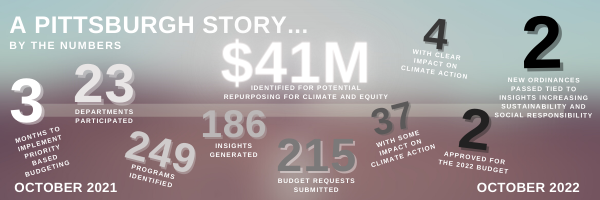
While the City of Pittsburgh participated in these workshops and created many ideas through the Insight process, ResourceX was busy with technology advancements in the background. By spring of 2021, the development of an initial version of the OnlinePBB Budgeter was complete. This revolutionary product allows municipalities to participate in their budget process at the program level, leveraging all of their invaluable program data to create budget requests, including their Program Insight data. All of those Insights created during the Program Insight Workshops could now be reviewed through the lens of an actual budget request.
Moving into 2022
The City of Pittsburgh made history with its 2022 budget preparation by submitting all 215 budget requests at the program level. By doing so, OMB could require all of the traditionally needed information for their process tied to a program. The Sustainability and Resilience Division included an evaluation of each request against specific aspects of the Climate Action Plan. Of the 215 budget requests city-wide, 37 were marked as having some impact on climate, and four were identified as having a clear impact on climate. Of those four, two were included in the 2022 Operating Budget presented by Mayor William Peduto on September 30, 2021. Of those two, one was the continuation of Priority Based Budgeting in 2022 to support their data-driven approach to budget decisions.
With the Mayor's presentation of the 2022 budget, Mayor Peduto emphasized that this was the first year the City of Pittsburgh utilized Priority Based Budgeting. The implementation of PBB allowed for an enhanced, data-driven approach to budget decisions centered around equity and climate. Additionally, this budget was presented with no tax increases and, despite COVID-19, maintained their AA- S&P credit rating.
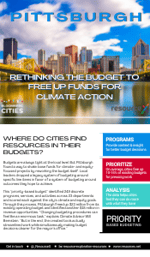
Rethinking the Budget to Free Up Funds for Climate Action in Pittsburgh, Pennsylvania
Where do cities find resources in their budgets?
Exciting Programmatic Alignment to Climate Action
To round out an exciting year of participation with the ResourceX tools and the utilization of their PBB data, and to come full circle back to the initial effort of program identification and program Insights, Mayor Peduto introduced two ordinances to City Council to help Pittsburgh transition to sustainable consumption and production through innovative procurement practices. The first ordinance will mandate the use of electronic signatures across City departments, and the second addresses sustainable and socially responsible procurement. These new ordinances can be tied back to the program data associated with their Procurement program and the Program Insight recommending DocuSign.
Moving forward, the City of Pittsburgh will continue to integrate sustainability and resilience into City processes. To accomplish this and the 2030 climate goals, the City is building Priority Based Budgeting into the City’s budget process, releasing an energy strategy to create a framework for the 2030 goals and Electric Vehicle (EV) legislation to accelerate EV deployment across Pittsburgh.
Priority Based Budgeting
Programs empower everyone with an increased understanding of the services your local government provides, the cost of the provision of that service, how each aligns with the strategic purpose of your community and enables informed decision-making when allocating the resources available to your community.
We believe in the purpose of government and its potential to lead the charge in tackling some of the world’s greatest challenges. You are the change-makers and the program is your vehicle for change.
Learn more about priority-based budgeting in our Essential Guide.
